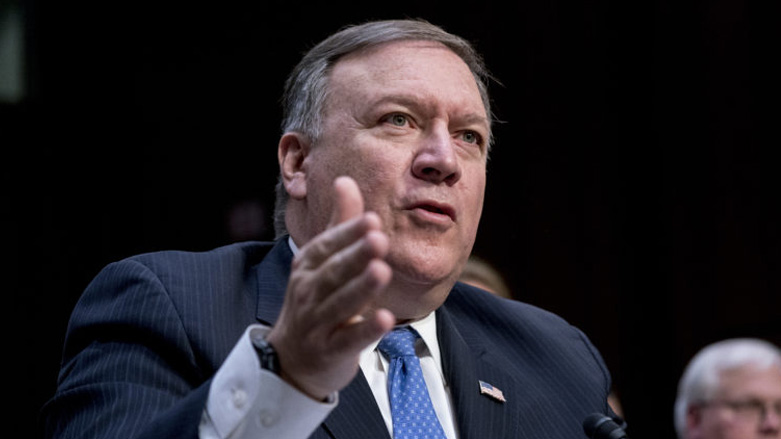Pompeo calls for freedom in Iran; Trump threatens severe consequences

WASHINGTON DC (Kurdistan24) – Speaking at the Ronald Reagan Presidential Library on Sunday evening, US Secretary of State Mike Pompeo began his address by denouncing the Iranian regime as “a nightmare for the Iranian people.”
He ended his speech citing Ronald Reagan, who supported liberation movements around the world and whose policies are widely credited as precipitating the collapse of communism, the Soviet bloc, and the Soviet Union itself.
Pompeo recalled a speech that Reagan gave in 1982 to the British parliament when the Soviet Union and the Cold War appeared to be permanent fixtures of international politics.
“Freedom is not the sole prerogative of a lucky few, but the inalienable and universal right of all human beings,” Reagan told the British MPs, Pompeo said. “This is why we call on all governments to end their flirtations” with the Iranian regime “and come quickly to the aid of the Iranian people.”
Thus, although the Trump administration claims it seeks only to change the behavior of the Iranian regime, Pompeo seemed to come very close to calling for its overthrow.
He described how the money that Iran received from the relaxation of sanctions after the nuclear deal was used to fund an ideologically-driven policy of aggression across the region.
“The average Hezbollah combatant makes two to three times the monthly salary of a firefighter in Tehran,” he said, while “a third of Iranian youth are unemployed and a third of Iranians live below the poverty line.”
“Assad, Lebanese Hezbollah, Hamas, Shia militant groups in Iraq, and the Houthis in Yemen feed on billions in regime cash, while the Iranian people shout slogans like ‘Leave Syria, think about us,’” Pompeo explained.
Detailing the corruption of Iran’s leadership, including senior clerics, who “seem more concerned with riches than religion,” Pompeo described the wealth of Grand Ayatollah Makaram Shirazi, known as the “Sultan of Sugar,” for his illicit trade in that basic commodity.
Shirazi has made over $100 million, as he pressed the Iranian government to lower domestic subsidies, while he flooded the market with imported sugar, Pompeo explained.
And Iran’s Supreme Leader, Ayatollah Ali Khamenei, controls “his own personal, off-the-books hedge fund,” which is worth $95 billion, Pompeo stated. “The wealth is untaxed, ill-gotten and used as a slush fund for the [Islamic Revolutionary Guards Corps.]”
“These hypocritical holy men have devised all kinds of crooked schemes to become some of the wealthiest men on earth, while the people suffer,” he affirmed.
Pompeo also described Iranian assaults on the US during Operation Iraqi Freedom (OIF): “over a thousand American service members have been killed and wounded in Iraq from Iranian-made IEDs.”
Iraq’s Popular Mobilization Forces (PMF) include the very same Iranian-backed groups responsible for killing US service members during OIF, a former Pentagon official complained to Kurdistan 24. They have been formally incorporated into Iraq’s Security Forces—including the groups that killed Americans—and are armed and paid by Baghdad.
“Pompeo’s own department accepts and defends that,” he said with some frustration.
Indeed, one such group—Kata’ib Hezbollah, led by the deputy head of the PMF—threatened on Saturday to attack US forces in Iraq if Israel bombs “Iranian targets” in that country (last month, Israel attacked Kata’ib Hezbollah forces in Albu Kamal, Syria, just across the border from Iraq.)
Religious freedom is an important issue for the Trump administration, and the State Department will host a ministerial conference this week on advancing religious freedom.
“The regime’s absolute adherence to the Islamic Revolution means it cannot endure any ideas in Iranian society that would contradict or undermine it,” Pompeo said.
He detailed the persecution of Gonabadi Sufi Muslims in Iran, including the months’ long house arrest of their 91-year-old leader, Dr. Noor Ali Tabandeh, who is in need of urgent medical care.
Entifadh Qanbar, an Iraqi-American and head of the Future Foundation in Washington, explained that when a Shia converts to Sufism or any other religion, it represents, a rejection of the governing tenet of the Islamic regime: Vilayat-e Faqih, the rule of the Islamic Jurist.
This is a “struggle over power,” Qanbar stressed. “It is about ruling, not praying.”
In addition to reasserting the US goal of cutting off all Iranian oil exports by November 4, Pompeo announced that the US would soon launch a new Farsi language channel, operating 24 hours a day.
Asked whether it was “realistic to think” that Iranians might “regain control of their country” in the foreseeable future, Pompeo responded, “Of course.”
“Things change,” he continued. “There are disjunctive moments. There are times when things happen that are unexpected,” he said, citing “our revolution” as an example.
Qanbar called Pompeo’s speech “music to my ears,” adding, “there is nothing better for the US to export than freedom.”
Arash Saleh, a representative of the Democratic Party of Iranian Kurdistan in Washington, similarly welcomed Pompeo’s address.
“He was explicit and clear about Iran’s malign behavior and dictatorship,” Saleh told Kurdistan 24.
“It was very important for the Iranian people to hear their voice resonate in the US, and, as expected, the speech has been widely welcomed by the Iranian people,” he explained.
Earlier on Sunday, before Pompeo spoke, Iranian President Hassan Rouhani said before a group of Iranian diplomats, “Mr. Trump, don’t play with the lion’s tail, this would only lead to regret,” adding, “America should know that peace with Iran is the mother of all peace, and war with Iran is the mother of all wars.”
Following Pompeo’s speech, Trump tweeted to Rouhani, “Never ever threaten the United States again, or you will suffer consequences the likes of which few throughout history have ever suffered before.”
Editing by Nadia Riva
